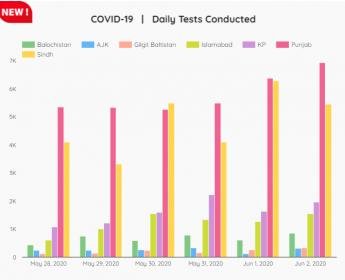- Joined
- Oct 2, 2004
- Runs
- 218,134
We are hearing a lot of stories and many claims by each province that they have done the best but which one has done it the best way?
Follow along with the video below to see how to install our site as a web app on your home screen.
Note: This feature may not be available in some browsers.

As the COVID-19 crisis continues in Pakistan, and across the world, one thing is becoming evident, which is that the provincial response to the crisis has varied significantly.
Be it daily tests or setting up quarantine facilities, the Sindh province has emerged as the most prepared of all the provinces in the country.
The following is a presentation of graphical evidence that suggests that Sindh’s current performance might be a result of it consistently prioritizing health, when compared with other provinces.
One crude measure of the capacities of provincial health sectors can be the number of hospitals and dispensary beds available. The graph below shows how different provinces differ in terms of beds per million of their population.
What stands out strongly from this graph is that Sindh has consistently had the highest capacity, when compared with other provinces followed by Balochistan. Punjab had the lowest.
While Khyber Pakhtunkhwa seems to be a peculiar case, as it showed a sudden increase in 2010, when the 18th amendment was passed and the 7th National Finance Commission Award was agreed upon.
However, after the formation of Pakistan Tehreek-e-Insaf government, there has been a sudden decrease in this particular indicator for the northern province.
While the number of hospitals and dispensary beds is a rudimentary indicator of how province’s prioritize health, another indicator is the spending on health. After the passage of 18th amendment and the 7th NFC, provinces were given the freedom to allot more funds to the health sector.
So how did they preform?
The National Health Accounts (NHA) published by the Pakistan Bureau of Statistics are a good source for making this comparison. However, I could not find the NHA beyond 2015-16, therefore the analysis is limited.
The graph below shows the total health expenditure per capita budgeted for by the four provinces from 2007-08 to 2015-16.
While all four provinces saw a higher health spending per capita after the 18th amendment, Sindh and Balochistan seem to have budgeted a higher per capita amount, when compare with Khyber Pakhtunkhwa and Punjab.
Khyber Pakhtunkhwa had been doing better than Punjab, however health spending seems to have taken a lower priority in Khyber Pakhtunkhwa after 2013.
This additional emphasis on the health sector over the past ten years might explain why Sindh seemed better prepared for dealing with the coronavirus.
The evidence of this was quantified by the World Health Organization’s situation report for Pakistan, dated April 5. It showed that Sindh was much better prepared to deal with this crisis than other provinces.
The COVID-19 crisis has shown the importance of provincial preparedness. Here is to hoping that the future budgets of all provinces reflect the importance of the health sector.
Note: The data used is from Pakistan Bureau of Statistics (PBS), first is the number of hospital and dispensary beds in Pakistan, by province, from 2008 to 2018. The other are various National Health Accounts reports. In both the data sources that were used for this graph, they have been lumping Khyber Pakhtunkhwa province together with the districts of Ex. FATA, even before the merger of ex-FATA with Khyber Pakhtunkhwa. It was therefore not possible to separate the data of Khyber Pakhtunkhwa from Ex FATA.






